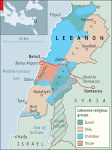The plan [to invade Lebanon] outlined in Washington was for the Israeli Air force to bombard Hizballah’s positions in the South, the West and southern Beirut. This would give the pro-government Christian, Sunni and Druze forces the opening for a counter-attack. Israeli tanks would simultaneously drive into the South and head towards Beirut in two columns.The first reaction to this, on my end at least, is holy shit!, followed by a, I told you so, and then a, well, it's not like this is anything they haven't done before. But upon more sober reflection, there is an important distinction between this (original) source and the Now Lebanon story that picked it up, which could start to make sense of this "plan." Now Lebanon claimed that it was the "Israeli security site, Debka," which leaked the story. They are the first to report this news but according to Debka, it was, in fact, US sources that leaked the information.1. The western column would take the Tyre-Sidon-Damour-Beirut coastal highway.
2. The eastern column would press north through Nabatiya, Jezzine, Ain Zchalta and Alei.
Sunday night, Olmert called Lebanese prime minister Fouad Siniora and his allies, the Sunni majority leader Saad Hariri, head of the mainline Druze party Walid Jumblatt and Christian Phalanges chief Samir Geagea and informed them there would be no Israeli strike against Hizballah. Jerusalem would not come to their aid.
According to American sources, the pro-Western front in Beirut collapsed then and there, leaving Hizballah a free path to victory.
As catastrophic, barbaric, and counter-productive as these plans might seem to most of us, there is a certain face-saving measure involved in such a US leak. For more than a week now, the Bush administration has had to answer to critics and journalists alike who claim that Hezbollah's purported takeover of West Beirut is the result of the president's failed Middle East policies. By leaking to the media that it urged Israel to attack Hezbollah, the United States can wash its hands clean of the situation, arguing that they tried their hardest to stop Hezbollah's apparent ascent but were thwarted by an indecisive and timid Israeli government.
The US's hand-wringing at what Israel did not do does not stop with the recent past. American officials are also now blaming Israel for the vitality of Hezbollah more generally over the past two years, the sustained power of Iran and Syria in the region, and the rise of Hamas in Gaza.
Despite all this sudden blame-shifting, the Bush administration still has the track-record that indicates how serious they may very well have been about pushing for an Israeli invasion. Thankfully, we would hope, Israel's own domestic political problems (stemming from the popular condemnation of the government's handling of the July 2006 war all the way to the most recent allegations of corruption against Ehud Olmert), in addition to the fact that they know that an invasion would most definitely spur Hezbollah into launching hundreds of rockets to as far south as Tel Aviv, may have saved us from a nightmarish situation. I still don't think it's outside the realm of possibility that Israel would launch some sort of military strike on Hezbollah, but their decision to hold back for now is (however convolutedly) a good sign.One US official said straight out to Olmert and Barak: For two years, you didn’t raise a finger when Hizballah took delivery of quantities of weapons, including missiles, from Iran and Syria. You did not interfere with Hizballah’s military buildup in southern Lebanon then or its capture of Beirut now.
IDF generals who were present at these conversations reported they have never seen American officials so angry or outspoken. Israel’s original blunder, they said, was its intelligence misreading of Hizballah’s first belligerent moves on May 4. At that point, Israel’s government military heads decided not to interfere, after judging those moves to be unthreatening.
The Americans similarly criticizes Israel for letting Hamas get away with its daily rocket and missile attacks on Israel civilians year after year. A blow to Hizballah would have deterred Hamas from exercising blackmail tactics for a ceasefire.

No comments:
Post a Comment